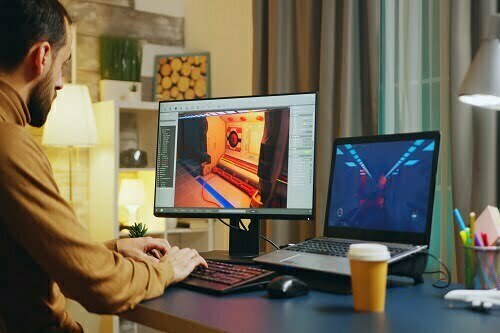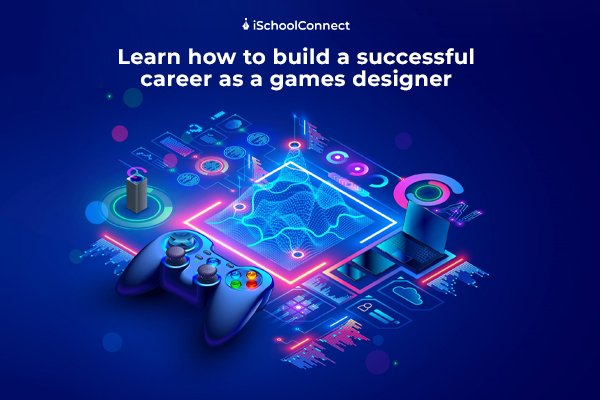Table of Contents
Game designers | An overview of them!
Game designers bring concepts, build prototypes, provide interactive narration, and develop the game’s mechanics. They specialize in a specific game element and work as part of a team for a commercial or independent game development company. As a matter of fact, game designers create systems that are easy to maintain, expand, and use while also providing a pleasant user experience.
The evolution of game design
Today, games are available in various formats and platforms, including mobile, virtual and augmented reality, console, and PC. As a matter of fact, organizations look for technical and creative skills to imagine, test, and develop gaming ideas.
Most commercial game production studios comprise vast groups of people contributing to the game’s success. Among the available positions are programmers, producers, level designers, modelers, animators, technical artists, testers, marketing and finance experts, and others.
Responsibilities of a game designer
Game designers can develop a unique concept as well as work on an authorized one, such as a game based on a movie. However, the fundamental responsibilities of a game designer are –
- Use ideas to create games for various devices and platforms that will captivate and grab the user’s imagination.
- Consider and plan every aspect of a new game, including the scenario, rules, plot flow, objects, and so on.
- In addition to this, game designers are responsible for turning a hazy idea into a detailed plan.
- Work closely with others, such as developers, artists, and programmers.
- Create a prototype – a small-scale playable version of the game that changes the game design parameters as the project progresses.
- Additionally, create storyboards and compose scripts.
- Guide Quality Assurance (QA) testers to play the game; so they can test it properly.
Game designers | How do they operate and manage workflow?
Today’s game designers can choose from a variety of expertise. Some designers concentrate on balance, employing spreadsheets and simulations to create tasks, while others focus on game controls, attempting to make them as responsive and meaningful to players as possible.
As a matter of fact, writers and/or world directors who focus on the player experience are amongst the others. Some game designers can even take on more creative director duties. They are responsible for communicating the game’s vision to other team members so that it is consistent and high-quality throughout.
Working hours of a game designer
On average, game designers work between 30 and 40 hours every week. As deadlines approach, they may need to work weekends and evenings. The majority of game designers work full-time, with only a tiny percentage working part-time or as freelancers.
Game designers | The exposure and experience
The competition for game designer jobs is strong; therefore, candidates need appropriate professional experience. Employers often want game designers to have at least two years of industry experience. Ideally, this is for both free-to-play (F2P) and premium or AAA games on a variety of platforms.

Game designers either start with an internship or campus placement with a game company during or after their degree. Internships in game design are periodically posted; however, competition for these positions is severe.
Because the game design industry moves so quickly, it’s vital to keep the technical skills and knowledge up to date. This can be accomplished through in-house training, short courses, and so on. In addition to this, professional development includes things like attending events, networking, etc.
What skills should a game designer have?
- Have a thorough understanding of game levels, level layouts, designing maps, architecture, and other aspects of game level design.
- Additionally, game designers should have the ability to deconstruct things into systems.
- Ability to obtain qualitative information from data in order to influence the designs.
- Know how to implement technical features in games, as well as scripting languages, syntax, and other fundamental programming ideas.
- To understand what the target audience wants and how to offer it to them.
- As a matter of fact, a basic understanding of marketing and market research is appreciated.
- Basic to advanced drawing skills are needed to graphically explain ideas.
- Basic knowledge of 3D art, modeling, texturing, rigging, animation, and other aspects of 3D art creation, use, and conversion is required.
- User Interface (UI/UX) knowledge in games, ranging from basic to advanced.

Software skills
- For documents, spreadsheets, and presentations, knowledge of Microsoft or Google Office software.
- Art software, such as Adobe Photoshop and Illustrator for visual design, flowcharting, and mind mapping.
- Software for Jira and Bug tracking
- LUA, C#, Unreal Script, and Blueprints are scripting languages and tools.
- C++ and Python are also widely used programming languages.
Key takeaways
- Game designing may be an offbeat career choice, but it has numerous perks.
- Game designers earn a decently lucrative salary, leading to an enriching career.
- As a matter of fact, many colleges offer game development courses today.
- Because the game design industry is so fast-paced, it’s critical to keep technical abilities and expertise up to date in order to stay ahead of the competition.
- Many online courses to upgrade game development skills are available today, allowing game designers to learn and expand their knowledge.
We hope this blog was helpful and informative for you. If you wish to know more about game designing courses, get in touch with us today!
Liked this blog? Then read Design engineer | Everything you need to know to become one!
FAQs
Question 1: What skills should game designers have?
Answer: A game designer should be well-versed in the following skills.
- Creativity
- Strong analytical mind
- Programming skills
- Solid knowledge of the gaming industry
- How games work and the latest trends
Question 2: Is game designing a good career choice?
Answer: As a matter of fact, yes! A career in game designing is enriching. However, you have to be passionate about the field. Only then can you achieve something big in the gaming industry.
Question 3: What is the difference between a game designer and a developer?
Answer: A game designer designs the layout or storyline of a project, while a game developer converts those ideas and designs into a final product.






